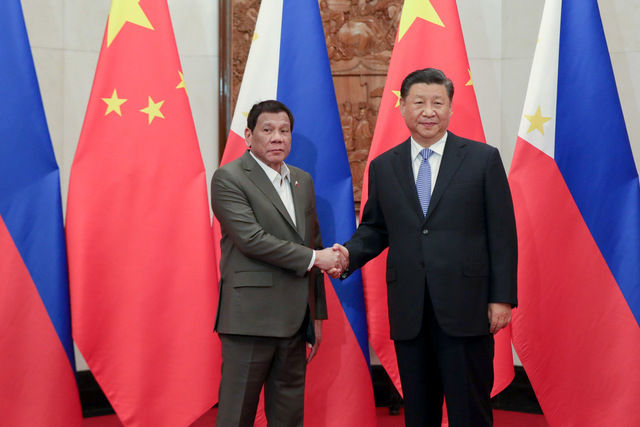Rocked by a slipping approval ratings on his soft stance with China, President Duterte raised with Chinese President Xi Jinping the international arbitral ruling on South China Sea that Manila won against Beijing, and as expected was given a cold shoulder by the leader of Asia’s economic superpower.
Instead, another Chinese leader, Prime Minister Li Keqiang got what China had wished for the past decades — to keep the world’s only military superpower and Philippines’ defense ally, the United States, out of of the South China Sea talks.
“And I would like to tell you now, in front of the media and all, that the passing of — or the passage of the Code of Conduct by China and everyone else is the least concern of America,” Duterte said in his opening remarks.
President Duterte met both Chinese leaders separately last Friday.
In a bilateral meeting with Chinese President Xi Diaoyutai State Guest House, Palace spokesperson Salvador Panelo said the two leaders simply “agreed to disagree” on their respective positions on the South China Sea Law of The Sea ruling.
A separate meeting with Chinese Premier Li at the Great Hall of the People appeared to be more sanguine on fast tracking the negotiations between Asean and China to complete code of conduct in the South China Sea. The code of conduct should govern how disputed countries behave in order to avoid war, which Asean and China had agreed in principle since 2002 but both sides were at loggerheads on the nitty gritty details of the document.
Both Xi and Li promised to finish the draft during Duterte’s presidency, hopefully in 2021 when the Philippines takes again the role of country coordinator for China-Asean dialogue.
“President Duterte and President Xi agreed on the importance of self-restraint and respect for freedom of navigation in – and overflight above – the South China Sea,” Panelo added.
President Xi, likewise, stressed the need for the newly formed Philippine-China steering committee to “prepare a substantive program” on how to conduct joint oil and gas exploration in the West Philippine Sea.
What remains to be the main thorn in the relations was that both countries still won’t relinquish territorial claims over the gas-rich South China Sea. Duterte waved the victory flag to Xi over the decision of the UN-backed tribunal that invalidated the claim of China of the South China Sea based on maps that only drew nine-dash lines around one of the most disputed flashpoints in the world. China had earlier refused to participate in the proceedings of the tribunal and ever since dismissed the ruling.
Duterte earlier took the flak for admitting that he had a verbal agreement with Xi in his previous bilateral meetings that allows Chinese fishermen to fish even in West Philippine Sea. Critics see this as softening of stance and abandonment of Law of the Sea court ruling as the public cried for justice for a group of Filipino fishermen were almost killed when their boat was accidentally rammed while anchored near Recto Bank.
This time, Panelo said, President Duterte was “steadfast” in stressing to Xi that the arbitral award is “final, binding and not subject to appeal.”.
“In response, President Xi reiterated his government’s position of not recognizing the arbitral ruling as well as not budging from its position,” he added.
Panelo said the two leaders “agreed to disagree” and “their differences however need not derail nor diminish the amity between the two countries.”
“Both leaders agreed to work together, on the basis of mutual trust and good faith, to manage the South China Sea issue, and to continue to dialogue peacefully in resolving the conflict,” said Panelo.
The Palace said the Chinese premier lauded Duterte’s efforts for forging warm relations with China, stressing that in the past three years, the Philippines-China bilateral relations “has started to turn around and continued to enjoy steady progress and sound development.




